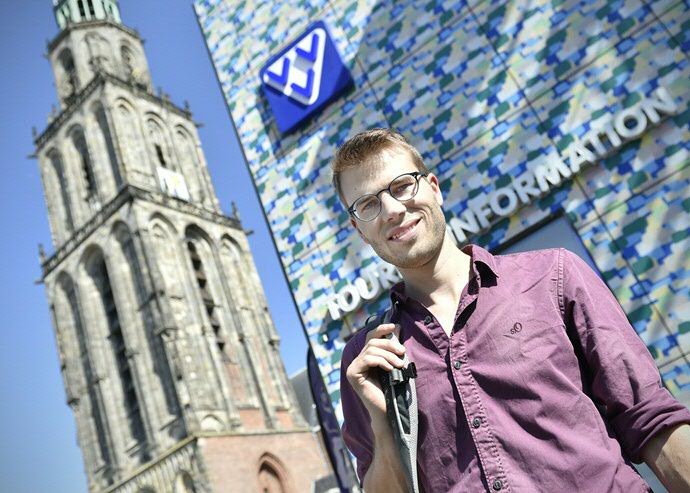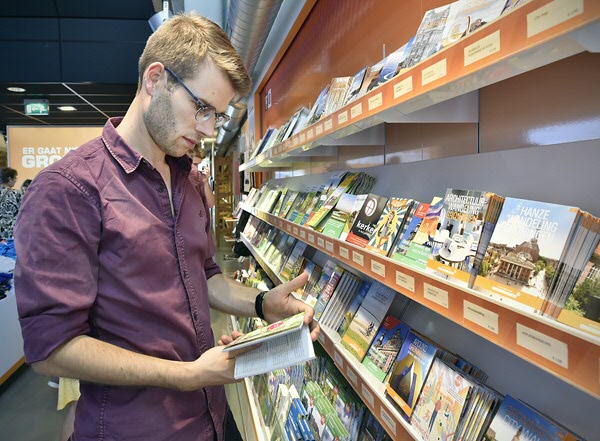Geographer Arie Stoffelen: ‘Travel has become a human right’

‘There’s no end to it, all that attention to over-tourism.’ Before a single question has even been asked, Geographer Arie Stoffelen launches into the topic, sighing almost. The reports about mass tourism, increasingly referred to as ‘over-tourism’, were never-ending this summer. Stoffelen thinks that this is only the beginning. ‘Travel has become a kind of human right.’
Text: Eelco Salverda, Communication UG / Photos: Elmer Spaargaren
Spreading out doesn’t work
In the week in which lectures have started again, a lot of English, German, Spanish and Chinese can be heard on the streets and the square in front of the Academy Building is the backdrop to chaotic traffic scenes, it is almost impossible not to start talking about crowds and over-tourism. What effect does the attention that over-tourism receives have on Stoffelen? Does it change his work? ‘I get lots of calls about it, but that’s not always good. It’s a bit of a shame that the topic has been hijacked like this. It seems as though tourism is equal to over-tourism. But there are many more aspects to it.’ Spreading tourists out is often mentioned as a remedy. Tourists are enticed from Amsterdam with trips to Muiderslot, the ‘leisure lakes’ (Vinkeveense Plassen) or even the ‘Amsterdam Lake District’ (a trip round the IJsselmeer). Stoffelen doesn’t believe this will work. ‘The only thing that will work is to stop marketing. There’s no alternative. People come to Amsterdam for the city; they are city trippers who want to cross things off their bucket list. They want to see the famous highlights.’
Travel as a right
Stoffelen predicts further growth in tourism. It’s a development that can’t be halted, he says emphatically. ‘There’s money – the middle class is growing in emerging countries with large populations. And travel has become a kind of human right. People work hard and want to relax. What began as a weekend off and holiday leave has now become the right to travel.’ Making flying more expensive may help, he thinks. ‘With city trips at least.’ A small change can be detected, says Stoffelen. Some Wadden islands have stopped creating more accommodation. ‘There, they are aiming for “better” tourism rather than more tourism. You can see another mindset starting to develop.’
Income for the region
As a child, Arie Stoffelen wanted to be an ornithologist. Now, he studies the migratory behaviour of people rather than birds. Or actually: how to better coordinate tourism so that regions will see socio-economic benefits. ‘I look at the organization of tourism behind the scenes, not at marketing and product development. In my research, the focus lies on regions, which often see tourism as an important source of income. Did you know that between 2014 and 2020 more than €8bn is going from the EU to its regions to stimulate the development of tourism?’
For everyone, by everyone
Tourism organizations, government, tradespeople, business, sometimes even multinationals: tourism is for everyone but is certainly also by everyone. Stoffelen believes there is often a lack of vision and collaboration, resulting in fragmentation and duplicate activities. In this scenario, tourism is not delivering what is expected of it. Stoffelen: ‘Things go wrong when people don’t work together properly. Everyone comes up with their own thing. But if that’s not coordinated and is not in consultation with the local population, then it gets derailed.’

Whisky tourism
Stoffelen gives the example of whisky tourism in Scotland. ‘There, they championed local traditions and the character of the region. But everything was determined by a few large distilleries. The result: a few parties benefit and the rest are dissatisfied. You have to involve local businesses and the population to make sure that they are comfortable with what you are doing. Don’t impose things from above. Take small steps. That’s not always the easiest way.’
Tangled mess of bike routes
Involving a lot of parties is no magic solution either. Stoffelen often sees what fragmentation leads to: too many information flows between the parties involved, too much information for visitors and too many similar products. ‘A lot of European money is pumped into bike and walking routes in border areas: €350m over the last seven years. A consequence of misguided policy is that loads of small routes have been created between all sorts of hamlets. I once made a map of such routes. It proved to be a tangled mess. Without good coordination you get individual initiatives. Someone knows the mayor of the neighouring municipality well and quickly sorts something out. But then you miss a broader vision of how to work together over the border.’
The fresh eyes of an outsider
Stoffelen mainly researches the policy and the collaboration behind the regional tourism that we see: which visions there are, who makes the decisions and why policy is unsuccessful. ‘When I do research, I notice that people find it interesting and important. For instance, I make a strengths/weaknesses analysis and offer advice. What happens with it in the end is another matter. The follow-up is often beyond your control as a researcher. But luckily, people never get the impression that I’m just coming to tell them what they’re doing wrong. They value an outsider’s opinion. I point things out that those involved often fail to see.’
More news
-
01 December 2025
The power of movement
-
24 November 2025
RUG en Ministerie van I&W starten brede meerjarige samenwerking
